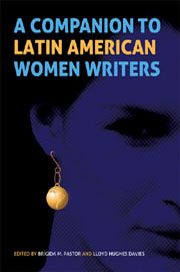Book contents
- Frontmatter
- Contents
- Introduction: The Feminine Voice in Latin American Literature
- 1 Sor Juana Inés de la Cruz (1648/51?–1695)
- 2 Gertrudis Gómez de Avellaneda (1814–1873)
- 3 Gabriela Mistral (1889–1957)
- 4 Alfonsina Storni (1892–1938)
- 5 Silvina Ocampo (1903–1993)
- 6 Clarice Lispector (1920–1977)
- 7 Rosario Castellanos (1925–1974)
- 8 Elena Poniatowska (1933– )
- 9 Alejandra Pizarnik (1936–1972)
- 10 Luisa Valenzuela (1938– )
- 11 Isabel Allende (1942– )
- 12 Rosario Ferré (1938– )
- 13 Laura Esquivel (1950– )
- 14 Laura Restrepo (1950– )
- Conclusion
- Bibliography
- Index
5 - Silvina Ocampo (1903–1993)
Published online by Cambridge University Press: 05 February 2013
- Frontmatter
- Contents
- Introduction: The Feminine Voice in Latin American Literature
- 1 Sor Juana Inés de la Cruz (1648/51?–1695)
- 2 Gertrudis Gómez de Avellaneda (1814–1873)
- 3 Gabriela Mistral (1889–1957)
- 4 Alfonsina Storni (1892–1938)
- 5 Silvina Ocampo (1903–1993)
- 6 Clarice Lispector (1920–1977)
- 7 Rosario Castellanos (1925–1974)
- 8 Elena Poniatowska (1933– )
- 9 Alejandra Pizarnik (1936–1972)
- 10 Luisa Valenzuela (1938– )
- 11 Isabel Allende (1942– )
- 12 Rosario Ferré (1938– )
- 13 Laura Esquivel (1950– )
- 14 Laura Restrepo (1950– )
- Conclusion
- Bibliography
- Index
Summary
¡Para qué sirve inventar!
Lo cierto es más raro. (Ocampo, 2006a: 11–12)
[Why make things up!
Fact is stranger than fiction.]
Para engañarme me decías siempre la verdad; para decirte la verdad yo siempre te mentía. (Ocampo, 1999: I, 400)
[To deceive me you always told me the truth; to tell you the truth I always lied to you.]
Introduction
Until Emecé began re-publishing her works in the late 1990s, the Argentinian writer Silvina Ocampo was a relatively well kept secret. Her eldest sister Victoria had a more prominent cultural profile through her influential literary journal and publishing house, Sur (see King, 1986). The inevitable comparison between them was begun by Victoria herself, who published Silvina's first book, Viaje olvidado [Forgotten Journey] (1937), then proceeded to pen a rather censorious review of it (Victoria Ocampo, 1937). Silvina Ocampo naturally shrank from the limelight – Ulla (1999) dubs her ‘una escritora oculta’ [a hidden writer] – and from the literary celebrity which gradually accrued not only to Victoria but also to Silvina's husband Adolfo Bioy Casares and particularly to her close friend Jorge Luis Borges. This hiding and masking of herself (Victoria's review described her as ‘una persona disfrazada de sí misma’ [a person disguised as herself] (1937: 119) allowed Ocampo the freedom to carve out an increasingly idiosyncratic literary niche which continues to defy satisfactory classification, perhaps explaining why she has tended to remain marginal in histories of Latin American literature.
- Type
- Chapter
- Information
- A Companion to Latin American Women Writers , pp. 83 - 94Publisher: Boydell & BrewerPrint publication year: 2012



